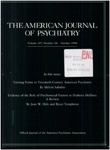Low-dose neuroleptic therapy for children with childhood-onset pervasive developmental disorder
Abstract
An open study of the therapeutic effects of low-dose neuroleptic treatment was performed on 12 consecutively hospitalized children, aged 7-11, who satisfied DSM-III criteria for childhood-onset pervasive developmental disorder. While receiving an average dose of 0.04 mg/kg per day of haloperidol or fluphenazine hydrochloride, the patients exhibited significant reductions in hyperactivity and aggressive symptoms and significant improvement in peer relations. This dose of neuroleptic was associated with minimal side effects. The authors conclude that low doses of potent neuroleptics may be effective treatment for some patients suffering from childhood-onset pervasive developmental disorder.
Access content
To read the fulltext, please use one of the options below to sign in or purchase access.- Personal login
- Institutional Login
- Sign in via OpenAthens
- Register for access
-
Please login/register if you wish to pair your device and check access availability.
Not a subscriber?
PsychiatryOnline subscription options offer access to the DSM-5 library, books, journals, CME, and patient resources. This all-in-one virtual library provides psychiatrists and mental health professionals with key resources for diagnosis, treatment, research, and professional development.
Need more help? PsychiatryOnline Customer Service may be reached by emailing [email protected] or by calling 800-368-5777 (in the U.S.) or 703-907-7322 (outside the U.S.).



